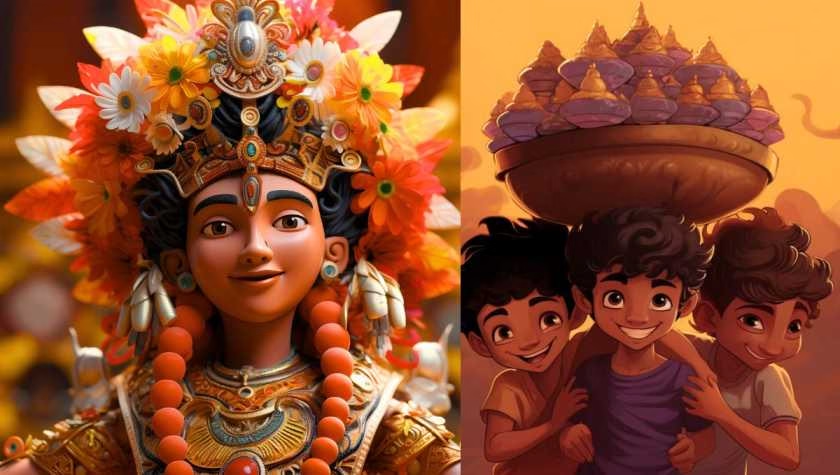Every year, millions of devotees across India, Malaysia, and Singapore flock to temples for Thaipusam, one of the most intense and spiritually eloquent Hindu festivals. It is a celebration of devotion, courage, and surrender – a time when devotees express gratitude to Lord Murugan (Kartikeya) for his victory over evil and the removal of obstacles from their lives.
In this article, you will learn what Thaipusam means, when it is celebrated, and why the festival holds such deep emotional and spiritual significance in Hindu culture.
Meaning and Origin of Thaipusam

The word Thaipusam comes from two Tamil words – “Thai”, the tenth month of the Tamil calendar (January-February), and “Pusam”, the name of a constellation that reaches its highest point during this time.
Thaipusam is dedicated to Lord Murugan, the son of Lord Shiva and Goddess Parvati, who is also known as the god of war and victory. According to Hindu mythology, on this day, Goddess Parvati gave Murugan a divine spear (spear) to defeat the demon Suryapadmana, symbolizing the victory of good over evil and light over darkness.
Therefore, Thaipusam is not just a ritual – it is a spiritual journey of purification, faith, and overcoming inner negativity.
When is Thaipusam celebrated?

Thaipusam usually falls in January or February, depending on the full moon of the Tamil month of Thai and the alignment of the Pusam stars.
- Thaipusam 2025 Date: February 11, 2025 (Tuesday)
- Moon Phase: Full Moon
- Nakshatra: Pusam (Pushya Nakshatra)
Devotees begin preparations weeks in advance by fasting, praying, and abstaining from worldly pleasures to purify the body and mind.
Spiritual Significance of Thaipusam:
Thaipusam is much more than a festival – it is a profound expression of devotion and gratitude. Devotees believe that by participating, they can overcome the obstacles of life and purify themselves from past karma.
Here is what Thaipusam represents spiritually:
- Faith and Surrender: Complete trust in the guidance of Lord Murugan.
- Purification: Symbolic purification of the mind, body, and soul.
- Renunciation and Devotion: Physical endurance as an act of devotion.
- Overcoming Evil: Victory over inner demons like ego, anger, and pride.
This powerful combination of self-discipline and faith makes Thaipusam one of the most transformative spiritual experiences for devotees.
How do people celebrate Thaipusam?
How people celebrate Thaipusam varies from region to region, but the core theme remains the same – devotion to Lord Murugan.
Read more:- Best Diwali Gifts 2025: Perfect Corporate & Employee Ideas
1. Kavadi Attam (Bow Dance)
The main attraction of Thaipusam is the Kavadi Attam, where devotees carry beautifully decorated structures called Kavadi as offerings to Lord Murugan. Some pierce their bodies, cheeks, or tongues with small spears (veles) as an act of penance and faith – all done in deep samadhi.
2. Pilgrimages and Processions
Thousands of devotees walk barefoot to the Murugan temple, chanting “Vele! Vel!” and singing hymns and devotional songs. Batu Caves in Malaysia, Palani Murugan Temple in Tamil Nadu, and Sri Thendayuthapani Temple in Singapore are among the most famous Thaipusam pilgrimage sites.
3. Offerings and Prayers
Offerings such as milk pots (pala kudam), fruits, and flowers are taken to the temple. Milk, a symbol of purity, is poured over the Murugan idol in a ritual known as abhishekam.
4. Fasting and Purification
Many devotees observe a 48-day fast before Thaipusam, abstaining from meat, alcohol, and worldly pleasures. This period of penance prepares them spiritually and mentally for the festival.
Global Celebrations of Thaipusam
Although Thaipusam originated in Tamil Nadu, it has become a global festival celebrated by Tamil communities worldwide.
- Malaysia: The Batu Caves celebration attracts over a million devotees and tourists each year.
- Singapore: Thaipusam is a public holiday and features huge processions with offerings of kavadi and milk.
- Sri Lanka, Mauritius, and South Africa: Rituals are held in local temples, blending traditional and regional customs.
These celebrations show how faith transcends borders, connecting millions of people through devotion and cultural pride.
The Message and Symbolism Behind Thaipusam
At its core, Thaipusam teaches an eternal truth – faith and perseverance can conquer any challenge.
- The veela represents divine wisdom and power that destroys ignorance.
- The Kavadi symbolizes the burdens of life, reminding us to bear them with humility and devotion.
- The act of piercing signifies detachment from pain and ego, reflecting spiritual awakening.
Thus, Thaipusam becomes a journey towards liberation from suffering, inspiring devotees to live with courage, compassion, and self-discipline.
Thaipusam is not just a festival – it is a living expression of faith, discipline and inner transformation. By expressing devotion to Lord Murugan, devotees seek strength to overcome life’s challenges and purify their souls.
So, the next time you watch Thaipusam – whether at the majestic Batu Caves or at a local temple – remember its profound message: the triumph of light over darkness and the triumph of devotion over ego.

Hi readers. I’m Piyali Batabyal, a passionate blogger who loves to share her thoughts, ideas, and experiences across a variety of topics—from lifestyle and beauty to personal growth and creativity. With a curious mind and a love for words.
Alongside my writing, I am also a professional makeup artist with a flair for enhancing natural beauty and creating transformative looks.

